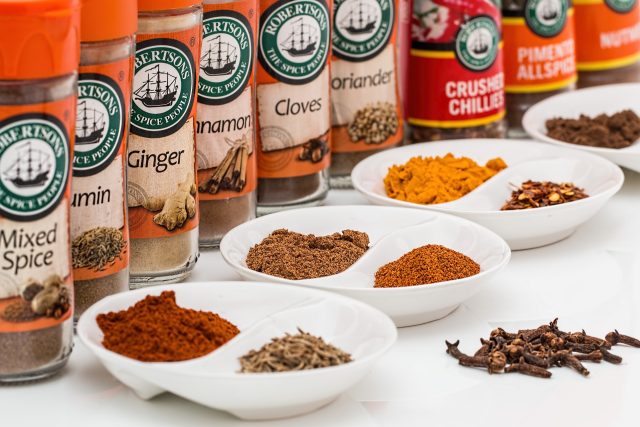It is easy to just cook with herbs and spices and assume that their only function is to make your food fragrant.
Well, did you know that they also have health benefits?Spices and herbs are gotten from plants which contain phytonutrients that have antioxidants.
Antioxidants are known for their beneficial properties to the human body, as they have anti-inflammatory and anticancer properties.
Asides from oozing up your meal and making taste senses explode, having some herbs and spices regularly in your kitchen is like having a makeshift 24hr pharmacy running in your home.
Here are 5 herbs and spices to have in your kitchen:
Cinnamon: This dark brown spice, according to research, has health benefits like reducing bad cholesterol(LDL) in the body and is also said to reduce blood sugar.
Root Spices: Rhizomes which are underground roots like ginger and turmeric are known to be nature’s antibiotics. They are efficient in combating the flu with their sweet and hot qualities and are great at bringing meals to life. Ginger is used in many cultures, particularly Thai, Chinese and Indian cooking.
Turmeric: can not go unnoticed as the bright orange colour is ready to stain everything it comes into contact with, including your palms. Pairing turmeric with black pepper gives a better deal as the black pepper merged with the turmeric helps the body absorb the nutrients and compounds of the turmeric.
Coriander: Whether fresh or dry, this flavorful spice may influence the reduction of sugar in the blood. Animal studies indicate that coriander seeds by promoting enzyme activity reduce excess sugar in the blood. However, this should be taken with caution or under expert advice. Again, being packed with antioxidants, these properties help curtail cellular damage caused by free radicals. It also has cancer-fighting properties, boosts immunity, promotes brain and heart health and promotes healthy digestion.
Worried about cutting down on salt and eating a tasteless meal? Using coriander can serve as a naturally healthier option when used to flavour foods as it encourages less salt usage.
Known as cilantro in North America and coriander in Europe and Asia, coriander is rich in iron, folic acid, calcium, magnesium, and vitamins A and K. According to studies, coriander leaves and seeds have 30% of the recommended dietary allowance of vitamin C, which promotes strong immunity.
Garlic: Be it fresh or dried in a powdery form, using garlic regularly has both culinary and health benefits. Technically a vegetable and known for its pungent smell, garlic promotes cardiovascular health. As an allium which is the family of onions, it is favoured in cooking for its antibacterial and antiseptic properties. Garlic is used to treat common colds while boosting the immune system. Like some spices, garlic lowers bad cholesterol.
High consumption of garlic supplements has shown an increase in antioxidant enzymes and also reduces stress in people with high blood pressure.
Garlic also functions as a detoxifier, as the high level of sulphur in it has been shown to protect the organs against toxicity of heavy metals, plus promoting bone health. Garlic can be used in soups, stews and sauces.
Cloves: Cloves are immature dried flower buds of a tree: syzygium aromaticum. A spoon of cloves is said to have 18 calories (carbohydrate, fibre, sugar, vitamin K, manganese, folate, vitamin B, vitamin E, and fat).
Heavily loaded with vitamins and minerals, cloves help to keep the blood sugar in check, protect against flu and aid in digestive health. Also having antibacterial properties, they are used in cosmetic products like soaps, toothpaste, and mouthwash.
Eugenol, which is found in cloves, helps to keep insects and mosquitoes at bay.
Native to Indonesian and Chinese cultures, cloves are used to enhance the rich taste of local dishes. Cloves have the highest amount of aroma concentration of any spice.


